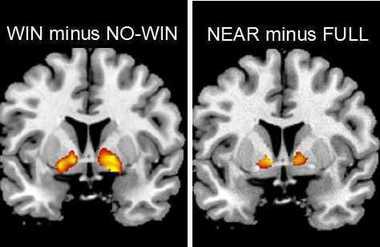

Gambling is an addictive pattern that seems to follow the same processing as any other addiction from drugs, to alcohol, etc.As we come to understand mental illness issues - gambling is another compulsive disorder, guided by one's genetic codes and environmental surroundings.
Studies have linked gambling disorders to variations in a variety of brain regions, particularly the striatum and prefrontal cortex, which are involved in reward processing, social and emotional problems, stress, and more. Some of these differences may be attributable to genetics. Twin studies and modeling work suggest that genes explain half or more of individual differences with gambling problems, specifically.
In people with gambling disorders as well as substance use disorders, a meta-analysis found that several studies showed less activity in the ventral striatum while anticipating monetary rewards. Along with other findings, those results suggest that this part of the brain contributes to impulsive behaviors for people with gambling problems.
Among other emerging insights, people with gambling problems also have smaller volumes in their amygdala and hippocampus, two regions related to emotional learning and stress regulation. Brain research might help explain why teenagers are particularly susceptible to gambling including the observation that different parts of the brain mature at different rates in ways that predispose teenagers to gambling and other risk-taking behaviors. The prefrontal cortex, which regulates impulsivity and decision-making, is particularly late to develop, especially in boys.
The overlap of brain activity seen in a gambling experiment - compared with that found in earlier studies of drug use - indicates the brain uses the same circuitry for the processing of diverse rewards. The results of a gaming experiment, coupled with findings from prior studies of the anticipation and experience of positive and negative outcomes in humans and laboratory animals, suggest that a network of interrelated structures ... coordinate the processing of goal-related stimuli.
A challenge for the future is to determine how different parts of these brain circuits affect the thinking, emotion and motivation involved in anticipation, evaluation, and decision-making. Identifying these regions of the brain and mapping the neural pathways that process the anticipation and 'rewards' associated with drug abuse would be a tremendous boost to the development of medications or interventions that could block these circuits and provide other treatment approaches.